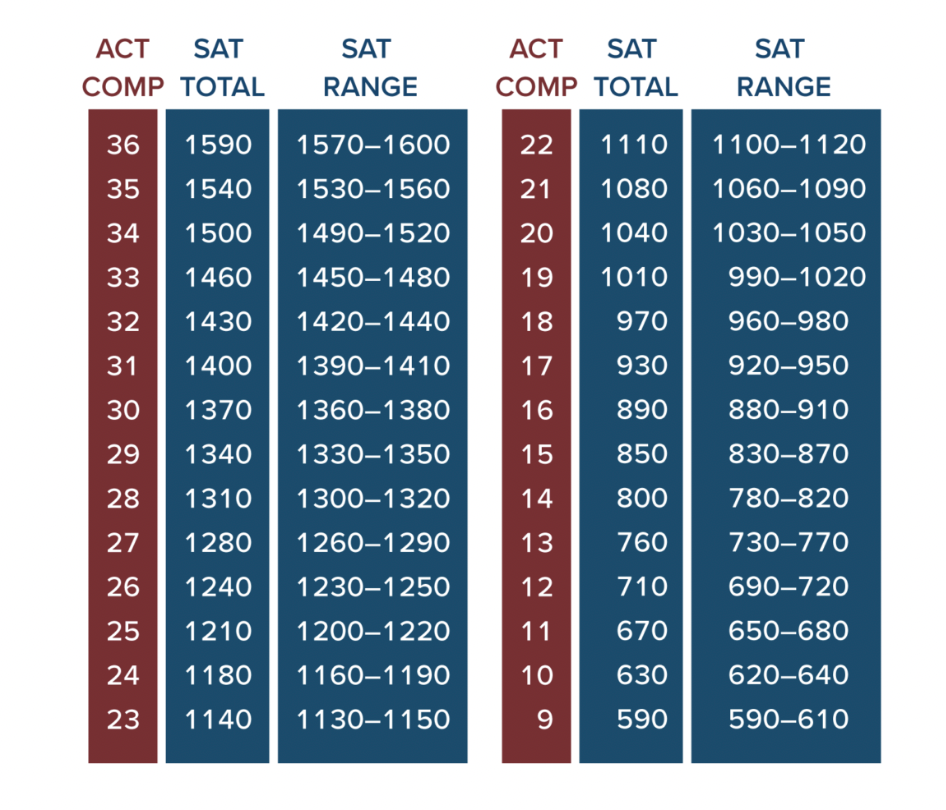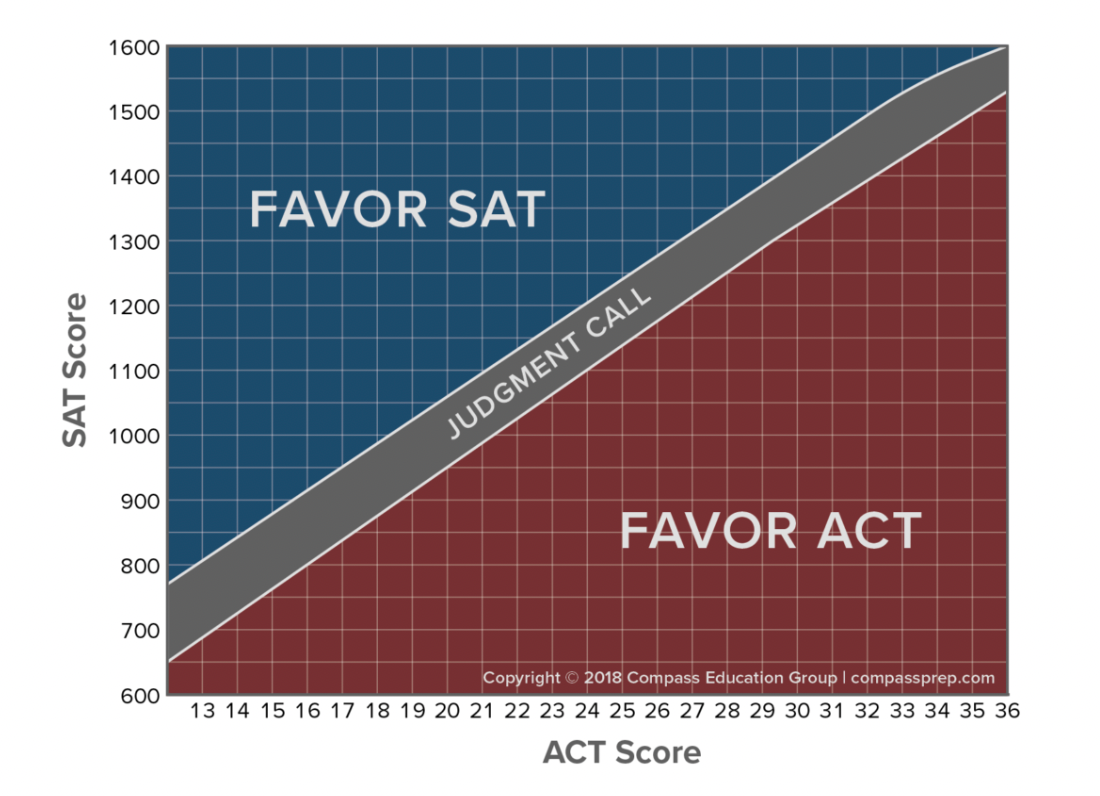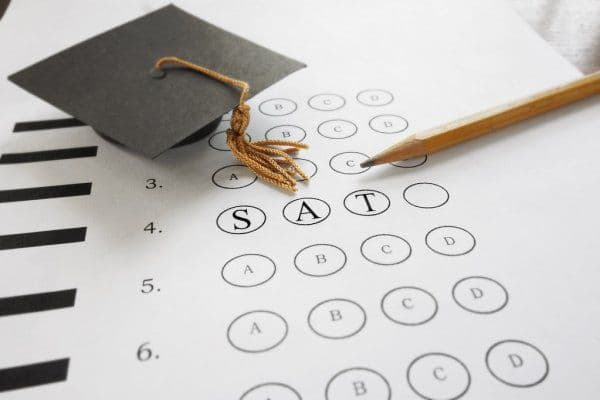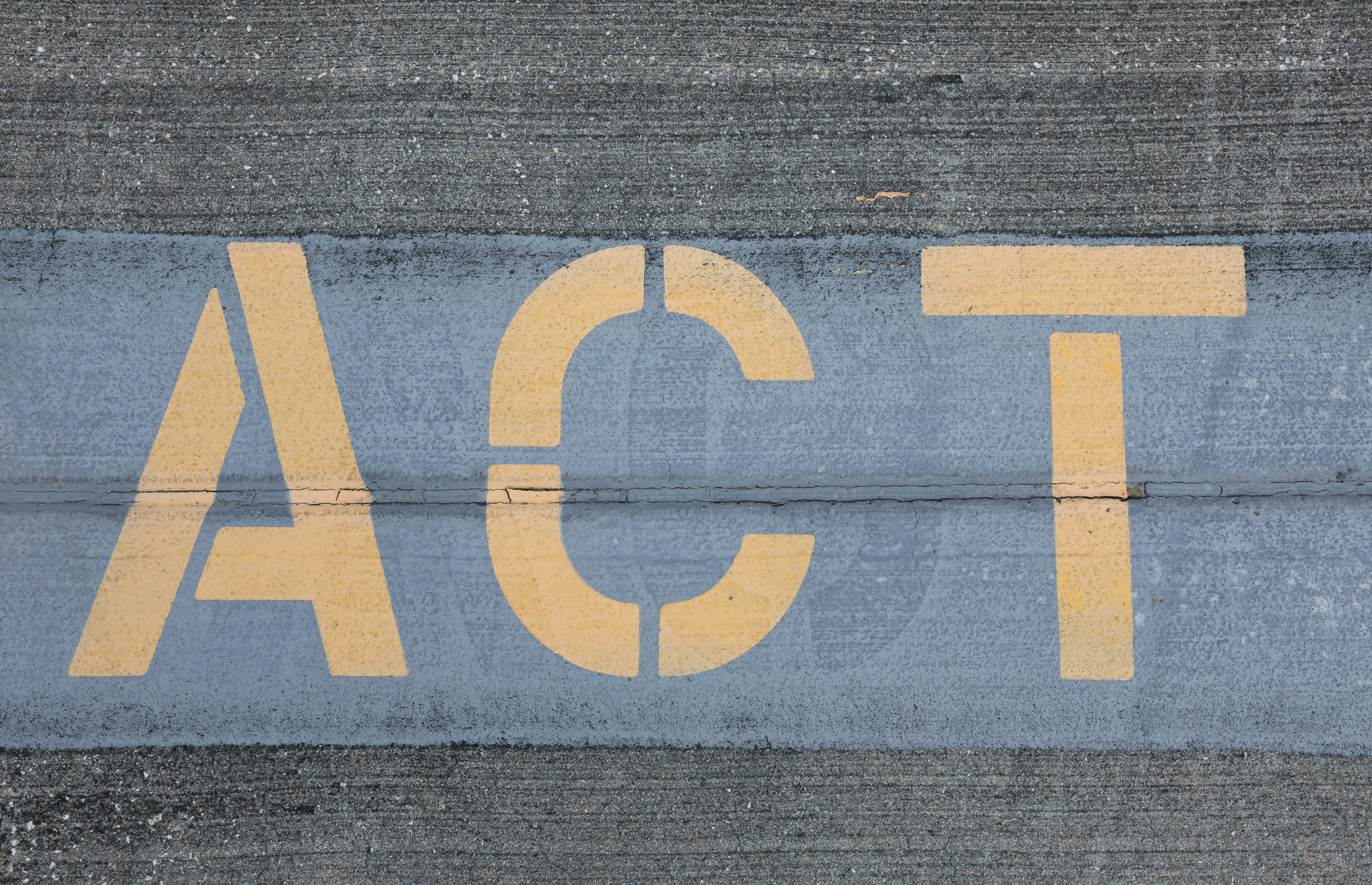
ACT vs SAT: What is the difference between ACT and SAT?
The ACT and SAT are both nationally recognized standardized tests that colleges use for admissions. Although many colleges have recently waived their requirements for standardized testing, the ACT and SAT are still an important component of your application.

This blog was originally published on Aug 18, 2023. It has been updated with the most current information.
*Please note: the ACT is currently undergoing a lot of changes. This blog is accurate as of current information for the Spring of 2026.
The ACT and SAT are both nationally recognized standardized tests that colleges use for admissions. Although many colleges have recently waived their requirements for standardized testing, the ACT and SAT are still an important component of your application. Your ACT or SAT score provides an opportunity for you to demonstrate your academic ability and for the college to gauge your skills against your peers. Nonetheless, these tests are rigorous and an understanding of each test’s structure and content will prepare you to decide which test is best for you!
How Important are SAT and ACT Scores in College Admissions Today?
For current high school students, standardized tests will continue to play a role in college admissions, if primarily as a differentiator: to demonstrate which students are college ready. If your aim is to show colleges your academic strength, then it’s a smart choice to take the SAT or ACT, as the high stakes pressure to take the test has dissipated, which means less anxiety and better performance on test day. Your test score will be one of many measurements in your college application that help you stand out, including application essays and statements, resume, references and your academic record.
The reading comprehension skills these tests measure are critical for college success, and thus even just preparing for the SAT and ACT will leave you in a better position to excel in college. Standardized tests are also integral in graduate school admissions and professional certifications such as the Bar exam, and preparing for the SAT or ACT will train you on test-taking skills needed for these future exams.
Are ACT and SAT Exams Accepted at All Schools?
Yes... There was a time when the ACT was required for West coast schools, and the SAT for East coast schools. Fortunately, those days are behind us and both exams are accepted at all schools, so which test you take is largely a matter of preference.
Main Differences Between ACT and SAT
At first glance the two standardized tests may seem very similar, but there are distinct and unique components of both the standardized tests.
Test Structure
Currently the SAT is offered exclusively in an online format. This digital SAT has two sections, Reading & Writing and Math. The ACT is offered in both digital and paper format.
Thanks to the new SAT digital format, the College Board has the capability to provide a unique test for each student, thereby reducing the potential for cheating and enhancing test security. Each section will commence with an introductory module. The student's performance on the initial set of questions will then dictate the difficulty level of all the subsequent questions they encounter. Schools, states, and districts will enjoy increased flexibility when scheduling tests, departing from the strict protocols governing the timing and delivery of the SAT exam that have traditionally been in place to maintain its integrity.
Both the ACT and SAT cover the same basic subjects: problem solving, mathematics, reading, writing, and comprehension. However, each of the tests presents the sections in a different order and under different names.
The SAT, now a digital adaptive exam, presents the sections in a pre-set order:
- Reading & Writing
- Math
You can find additional information about the adaptive exam here.
The ACT presents the sections in a pre-set order:
1. English
2. Math (Calculator Allowed)
3. Reading
4. Science (this section is optional)
The ACT also offers an optional essay (writing) section. The SAT no longer offers an essay section as an option.
The number of questions in each section of either test are different as well. The following tables summarize the number of questions that will accompany each section of the SAT or ACT and the amount of time allotted.
| SAT Sections | Reading & Writing | Math |
| Number of Questions | 54 | 44 |
| Total Time, min | 64 | 70 |
| ACT Sections (Paper/Digital) | English | Math | Reading | Science |
| Number of Questions | 50 | 45 | 36 | 40 |
| Total Time, min | 35 / 35 | 45 / 50 | 60 / 40 | 35 / 40 |
Math Section Differences
1. Structure of the Math sections
One of the major distinctions between the ACT and SAT has to do with the structure of the Math section. As you may have noticed, the SAT allows more time to complete fewer questions, as compared to the ACT. With this in mind, if you are not confident in your ability to solve Math problems quickly, then the SAT may be a better option.
2. Reference table
Another distinction between the math sections on the ACT and SAT has to do with a reference table. This reference table is only offered for the SAT and includes a variety of formulas you may need while taking the exam. Many of these formulas are for the geometry questions which make up about 10% of SAT Math problems. If you find that you struggle to recall the formulas you have learned in your Algebra and Geometry classes, then the SAT may be a better option for you.
3. Format of questions
The last difference between SAT and ACT math is the format of questions. The ACT is entirely multiple-choice, with five answer choices for each question. The SAT has a combination of multiple-choice questions, with four answer choices for each question, and “student-produced response” questions. These grid-in questions require you to produce the answer yourself and enter them accurately.
Reading Section Differences
The Reading section of the SAT will have question types that vary slightly from those on the ACT. Firstly, you can expect that the SAT will present the question chronologically. This means that the questions are in the same order as the material in the passage. This is not always the case for the ACT. Instead, questions accompanying the reading passage of the ACT can be presented in no clear order and can apply to any section of the passage. This means that you may spend more time on the ACT Reading section if you don’t remember where the ideas being questioned are in the passage.
Another unique component of the SAT Reading section is the use of Evidence Based questioning. These questions build on the questions directly preceding them and ask you to provide evidence for the answer you selected in the previous question. An example of an Evidence Based question with the question it is referring to is provided below.

English Section Differences
Both the SAT and ACT contain entirely passage-based English/Language sections. The first difference between the passage testing your English skills on the ACT and SAT are the section titles. On the SAT the section will be included as part of the “Reading & Writing” section. On the ACT the name of the section is simply English.
Similar to the SAT Reading passage, the SAT “Reading & Writing” section will also present evidence-based questions. Again, these questions will rely on your answer to the preceding questions and will ask you to justify that answer. The ACT English section will not ask evidence-based questions.
Science Section Differences
The ACT is unique from the SAT in its inclusion of a Science section. This section tests your ability to comprehend scientific articles and interpret data. To do well on this section you should be comfortable looking at experimental data, interpreting hypotheses, and evaluating scientific models.
What students may not expect in the Science section is an emphasis on Reading comprehension. This is good for students who may not feel their scientific skills are as strong, because the Science section really is testing how efficiently you can retrieve information.
To elaborate further, the ACT Science section will often present topics in a passage that they expect you to have never heard about. Do not stress! All of the information needed to answer the questions is presented in the passage and any accompanying charts and graphs. While the SAT does not have a dedicated section for Science, you can expect a passage in the reading section to reference scientific experiments and require an understanding of how to interpret scientific data. For more information on the ACT’s Science section, look to our blog post on ACT Science Tips.
Writing & Essay Differences
Although in the past both the SAT and ACT offered an optional essay, as of Summer 2021 the SAT no longer offers this section. This means that if you want to demonstrate your writing ability, the ACT may be the better choice for you. This essay will be in response to an essay prompt describing an issue and three different perspectives. Your task will be to formulate your own personal opinion/perspective in a cohesive written response.
Timing
Since moving to digital formats the timing of the exams has changed significantly. The SAT now takes 2 hours and 14 minutes (compared to over 3 hours previously). The paper version of the ACT still takes approximately 3 hours to complete. The digital version of the ACT takes just over 2 hours, with an additional 40 minutes each for Science and Writing if you choose to take them (for a total of 3h 25m). Each test allows a different amount of time for each of the sections, detailed in the tables below.
| SAT Sections | Reading & Writing | Math |
| Total Time, min | 64 | 70 |
| Time per Question, sec | 71 | 95 |
| ACT Section - Digital Version | English | Math | Reading | Science (Optional) |
| Total Time, min | 50 | 45 | 40 | 40 |
| Time per question, sec | 42 | 67 | 67 | 60 |
| Sections | SAT, Time per Question | ACT, Time per Question (Paper / Digital) |
| Reading / Reading & Writing | 71 sec | 67 sec |
| English | - | 42 sec |
| Math, with Calculator | 95 sec | 67 sec |
| Science | - | 60 sec |
Overall the SAT allows approximately 82 seconds per question compared to the ACT which allows only 59 seconds per question on average. With that in mind, if you struggle with the time limit or completing all the questions in the allotted time, then the SAT may be the better option for you.
Test Dates
The ACT and SAT both offer the test approximately every 1-2 months during the school year. You should make sure that you have taken your test before your college applications are due if you wish to include your scores in your application package.
Most students begin taking the SAT or ACT during their junior year, either in the fall or the spring. Seniors who wish to take the standardized test before early-decision or early-action applications are due should aim for a test date in early fall. You may wish to organize your test date for a time when you will have less distractions in your life. The following table summarizes the test dates for the 2024-2025 school year. These test dates vary slightly each year, but for planning purposes you can expect the test to be offered around the same dates for the 2025-2026 school year.
| SAT Test Dates* | ACT Test Dates |
| March 14, 2026 | February 14, 2026 |
| May 2, 2026 | April 11, 2026 |
| June 6, 2026 | June 13, 2026 |
| July 11, 2026 |
*Students who need to borrow a device from College Board will need to register and request their device earlier than the registration deadline—at least 30 days before test day.
**No test centers in New York are scheduled for the July test date.
Test Registration & Deadlines
In order to take either the ACT or SAT on your desired test date, you must register for your preferred test. Both the ACT and SAT registration are offered only online. What you will need for your SAT or ACT registration is a computer with internet, a credit card or other form of payment, your high school course details, and a headshot photo.
Registration for the SAT is located at collegeboard.org. Registration for the ACT is located at act.org. Each site will require you to make an account the first time you click “Register for a test”. Make sure to enter all of your personal information accurately, select your preferred test date and center, and upload your photo.
Both the ACT and SAT offer add-ons that may be of interest. We recommend ACT’s “Test Information Release” and SAT’s “Question-and-Answer Service”. These add-ons are valuable because you will receive a copy of the test you took, as well as a report with your answers and the answer key. Note that the ACT "Test Information Release" service is only available for certain test dates and are available to purchase for up to 6 months post exam.
It is always best to register as far in advance as possible for any test dates that you are considering attending. This way you can guarantee you have a seat at the test location most convenient to you. Keep in mind that the early fall dates are often the most popular, so if you are considering taking a test then, you should take extra care to register as soon as possible. SAT registration generally opens the earliest, with the ACT only opening registration for the coming school year after the last test date of the previous school year. This means that if you are considering taking the August test date, you may only have a short period to register. There are both standard deadlines and late deadlines for registration that you should keep in mind. The dates to keep in mind for each test date are summarized in the tables below.
| SAT Test Dates | Standard Registration Deadline | Late Registration Deadline |
| March 14, 2026 | February 27, 2026 | March 3, 2026 |
| May 2, 2026 | April 17, 2026 | April 21, 2026 |
| June 6, 2026 | May 22, 2026 | May 26, 2026 |
| ACT Test Dates | Standard Registration Deadline | Late Registration Deadline |
| February 14, 2026 | January 9, 2026 | January 23, 2026 |
| April 11, 2026 | March 6, 2026 | March 24, 2026 |
| June 13, 2026 | May 8, 2026 | May 29, 2026 |
| July 11, 2026 | June 5, 2026 | June 24, 2026 |
Test Rules
You can expect there to be rules you must follow on your test day. These regulations are in place because both the SAT and ACT want to ensure a fair, standardized test-taking experience for every student. One of the most important rules is to never attempt to cheat or get an unfair advantage while taking the SAT or ACT. This is important because if only some students get an advantage, then college admissions and future student’s scores could be negatively affected.
A difficult rule to follow is leaving your cell phone behind. If at all possible, leaving your cell phone behind ensures you won’t forget to turn it off or keep it off your person and accidentally get dismissed from the test. If you must have your cell phone with you on your test day, turn it off and leave it in your bag for the entire time, including the break. Lastly, never discuss the test, even with other students who have taken it.
When taking the ACT or SAT, there are 7 things you should bring with you to the test location:
1. Your Admission Ticket. Print a copy of your admission ticket. If you have lost your admission ticket you can print another through your MyACT or College Board account that was created when you registered for your test.
2. Acceptable Photo ID. Your ID must be a current (not expired), hard plastic, original ID that is issued by your school or a city/state/federal governmental agency. The first and last name on your ID must match the first and last name on your admission ticket. If you do not have an acceptable form of photo ID you must have the ACT Student Identification Form or SAT Student Identification Form notarized by a school official or notary public.
3. Pencils. Bring sharpened #2 pencils. Do not bring mechanical pencils or other writing instruments, they will not be allowed.
4. Timing Device. You can bring something to time yourself and watch your pacing during the test. This can be a watch, a timer, or a stopwatch, whichever you prefer and know how to use best. A timing device is included in the interface for the SAT.
5. Calculator. You are allowed to use a calculator on the Math section of the test. Make sure that you have access to a calculator on the permitted list and bring it with you on the day of the test. Both the ACT and the SAT have a calculator built into its testing interface.
6. Snacks. Your brain needs energy when you’re working hard. Make sure to bring a snack that you enjoy to repower during the break outside the test center.
7. Water. While you will not be allowed to drink your water while taking the test, make sure that you have a bottle to drink during the break for rejuvenation.
Scoring
The SAT and ACT score your test differently.
Your SAT score will be reported as a value between 400 and 1600. This final value is the sum of your scores on the Evidence-Based Reading and Writing sections (Reading and Writing & Language) and the Math Sections (Calculator and No Calculator). You can earn between 200 and 800 points on both the Evidence-Based Reading and Writing sections and the two Math sections.
Your ACT composite score will be reported as a value between 1 and 36. This value is the average of the English, Math, and Reading sections. Science is now optional and the score is separate regardless if you take it or not.
The difference in scoring methods, one summed and the other averaged, means that your Math score counts for a different percentage on either test. Your Math score counts for half of your score on the SAT and only a third on the ACT. It is important to note that both tests use rights-only scoring, which means you will not be penalized for guessing.
Acceptance
The SAT and ACT are accepted by all four-year colleges and universities in the US that use standardized testing for admission purposes.
Scholarships
Your results from either the SAT or ACT can earn you a merit scholarship. A merit scholarship is financial support to aid with the cost of higher education such as tuition, books, or a meal plan. Some colleges offer a full-ride, covering the full cost of tuition, based on your ACT or SAT scores! This is a major advantage of taking a standardized test. PrepScholar offers an incomplete list of universities and colleges that offer merit scholarships. If you do not see a college that you are interested in on the list, make sure to look on their website. Some merit scholarships require an application so be sure to do your research early if you know you are interested in a school.
Costs
The SAT and ACT both cost money to take unless you have received a fee waiver. If you do not receive a fee waiver for the standardized tests, then the SAT will cost $68 and the ACT will cost $68.
If you choose to register for the ACT with the optional essay section, then it will cost an extra $25. If you choose to add the science section, it will cost an extra $4. Additionally, sending your scores to colleges of your choice can cost you. The ACT charges $16 for each college and the SAT charges $12.
If you receive an SAT Fee Waiver, then you may take two tests for free and avoid late registration fees. The SAT Fee Waiver also covers the cost of sending score reports to two colleges of your choice as well as two chances to access the Question-and-Answer add-on free of charge.
If you receive an ACT Fee Waiver, then you are able to register for four free tests. The ACT Fee Waiver also allows you to receive unlimited free score reports as a test add-on.
ACT to SAT Score Conversion
If you have already taken an ACT or SAT, you may be wondering how you would have done on the other test. Thankfully, it is possible to convert your SAT score to an ACT score and vice versa.
Score conversion can inform you of which test you perform better on and can inform which you will use for your college admissions. Also, although most colleges accept either ACT or SAT scores, some may have a preferred test that they will convert your score to. You should know what your SAT or ACT scores mean in comparison with each other and how colleges will use them to determine your academic abilities.
The following figure provides a standard conversion between SAT and ACT scores. For example, if you earned a 1380 on the SAT, then your comparable score on the ACT would be a 30.

ACT vs SAT: Which is easier?
Unfortunately, students wishing to find the easier testing options are unlikely to do so. The differences between the SAT and ACT should help you identify which plays to your own unique strengths. This means you may find one test feels easier or induces less stress when taking. This is why taking both a full-length ACT and SAT test at least once is often best to determine which will be better for you. Trust your gut and personal preferences when choosing which standardized test to take.
ACT vs SAT: How to choose which test you need?
Thankfully, one of the best ways to guide your choice in standardized testing is understanding the differences between the two tests. You have made a great head start in this! These differences may play to your personal strengths and weaknesses and can dictate which test you will do better on. If you are finding in practice tests that you do not have a preference for either, you may wish to make your decision based on score. The conversion chart below provides a guideline for whether you should take the ACT or SAT. For example, if you scored a 1350 on your SAT practice test and a 33 on your ACT practice test, then you should take the ACT.

3 Reasons to take SAT
1. You want more time per question.
The SAT allows approximately 70 seconds per question compared to the ACT which allows only 49 seconds per question on average.
2. You are confident in your Math abilities.
The SAT is better if you are strong in Math because your Math score counts for half of your final SAT score and only a quarter of your final ACT score.
3. You’re not a fan of Science.
The ACT has a Science section which tests your data and figure interpretation. If these are not your strongest skills, then the SAT is the better choice because only your scientific Reading comprehension is tested.
3 Reasons to take ACT
1. Science is your strong suit.
The ACT is the only standardized test that offers an opportunity for you to demonstrate your data interpretation abilities.
2. You are not as confident in solving Math problems.
The ACT is better if you are not confident in Math because your math score counts for a quarter of your final ACT score. Your math score will count for half of your final SAT score in comparison.
3. You want to compose an Essay.
Although the SAT and ACT both used to offer an optional Essay, only the ACT continues to offer this option. If you wish to show your skills in writing and essay composition, then the ACT will provide you an opportunity to do so.
Should students ever take both exams?
It’s uncommon for a student to prepare for and take both exams, and we do not recommend it. Preparing for both tests is too much for the brain to handle. Test prep involves repetition, helping you to get to know these tests to the point where you are no longer surprised by tricky questions, and you can anticipate what’s coming next. This is much more easily done when you are preparing for only one test.
If, after taking a diagnostic test, it is still not clear which test is better for you, then do a full, timed ACT practice test, and a full, timed SAT. This will give you the extra information you need to make your decision.
The one situation in which you might take both tests is if you have worked over the long term to prepare for one test and taken it, and then the other test becomes available through your school. Having honed your skills with the first test, you may decide to take the other as well, to see if you can score better with the different format.
What can students do prior to starting test prep to increase their scores?
The central skill in the SAT and ACT is Reading Comprehension, as every single section involves reading and understanding questions, as well as visual aids and longer passages in some sections. Get started by reading periodicals such as the New York Times, the Wall Street Journal, the Economist, WIRED, Rolling Stone, etc. Use this reading not only to build your read comprehension skills, but also to improve your vocabulary, by looking up words you don’t know. Read from publications you enjoy, as well as ones you don’t enjoy. Getting through boring passages is a helpful skill not only for standardized tests, but for college and beyond!
As for specific Math and English skills, get familiar with the Khan Academy website, which has courses and practice questions that will help you in your schoolwork, as well as a dedicated SAT prep section.
How long does it take to prep for ACT and SAT tests?
In short, most students should set aside 3-4 months, for either test. Here’s what we suggest, ideally:
Start with a diagnostic in the 10th grade, to help you understand what score you are starting from, how far you are from your goal score, and whether you need to gain overall test-taking skills as well as content mastery in order to get there. Not everyone who is a good student is also a good test-taker, and you may need to develop skills in pacing, handling anxiety, as well as address content gaps such as grammar rules or polynomial equations.
If your aim is to improve your score “as much as possible”, without a specific target score in mind, think again. This is often a mistake, as a realistic, achievable target score is more motivating than a perfect score or an undefined increase. Knowing your target score can also help you allot the necessary time for test prep, as well as guide test-taking strategies, such as how many questions you need to answer in each section.
Once you know your baseline and target scores, you should plan to set aside at least 3-4 months, where you work everyday or every other day for 30-60 minutes, along with two sessions a week with a tutor. A successful study plan will help you fill in content gaps, learn the test, and practice smartly. How much practice does it take? This is the biggest variable, as some students take longer to improve in their test scores.
Working with a SAT or ACT tutor will help you start your test prep with a customized study plan that is realistic in how much work is needed to reach your target score. In addition to coaching you through the test prep journey, the ACT or SAT tutor provides personalized attention, helping you absorb content, understand why you got questions wrong, and develop your test-taking skills.
It’s best to set aside time when you can focus, without having many competing demands on your time, such as mid-year and final exams, sports schedules, etc. This also helps reduce the anxiety of test prep, helping you to learn more easily, retain knowledge and increase your score. Thus, many students opt to focus their test prep during the summer months. It’s also helpful to begin test prep once you have covered key math topics such as Algebra 1 and 2, Trigonometry, and Geometry, as these skills are featured in the math sections, and it can be easier to first learn these topics in school.
5 ACT and SAT Common Study Tips
1. Study well ahead of the test date.
The earlier you start preparing the better! More practice time before your test date helps to ease test anxiety. The more prep students have, the less surprised they’ll be and the less nervous they’ll feel about what to expect.
2. Work on time management.
Understanding the pacing of the test is crucial for you to perform your best on either the SAT or ACT. Both are rigorous and fast-paced. At Ivy Tutors Network, our experience has shown the best way to practice your pacing is to give yourself unlimited time on the first practice section of either the SAT or ACT.
Then, on the second practice section you take, limit yourself to 20 minutes longer than the true limit of the test. For example, on the reading section of the ACT you would limit yourself to 60 min (compared to the true limit of 40 min).
3. Unpack your practice test results.
After you complete either an ACT or SAT practice test, you should identify areas for improvement. This does not mean you should be looking at your score alone. When you identify patterns in incorrect answers you can work on mastering content areas.
4. Find the school for you.
Do some research on the schools that interest you. You should look for the average SAT and ACT scores for admission. An idea of how students who have been admitted performed on their standardized tests will help you establish your score goals. If possible, set your goals as a high school junior to best prepare you for the college admissions process.
5. Explore Ivy Tutors Network as a test prep resource!
Ivy Tutors Network can help! Our expert ACT and SAT tutors know all the tips and tricks for excelling high on the exam. With a little personalized attention, you’ll be well on your way to reaching your target score – or higher!




